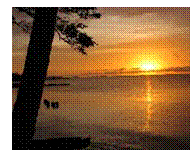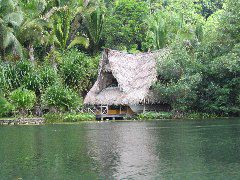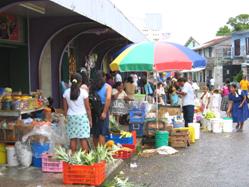
The University of Vermont Counseling Program
EDCO 291: Belize in Transition: Cross Cultural Counseling and health psychology in an age of Eco-Tourism
Dates: December 28, 2006----January 11, 2007
This three credit course will provide opportunities to develop cross-cultural perspectives on mental health by developing relationships with the Belizean people. Cross-cultural psychology will provide a theoretical foundation for the experience. Emphasis will be placed on developing intercultural communication skills. Mindfulness practices, which enhance the learning of these skills, will be utilized as we experience the diverse cultures of Belize and the diverse perspectives of the members of our class. Our laboratory will primarily be the isolated Toledo District of Belize, Central America. Our teachers will come from the village people with whom we will be staying and from the traditional healers from the Garifuna and Maya cultures.
Belize is on the edge of cultural transition. The Toledo Maya Indians as well as the Garifuna people are in danger of loosing their traditional land and lifestyle to oil exploration and corporate globalization. Eco-tourism presents an opportunity for these indigenous people to support their families without loosing their deep and historic economic and cultural roots.
Course Faculty are Carla and David Osgood. This team of psychologists has over 25 years experience teaching, counseling and consulting with individuals, couples, families and organizations. Dr. Carla Osgood is in private practice in Essex Junction, and Dr. David Osgood is a retired senior staff psychologist at UVM's Counseling Center. They have been traveling and teaching in Asia and Central America for many years.
Prerequisites: Permission of Instructors. (Although this is a graduate level class, appropriate undergrads are encouraged to apply)
Costs: Besides the usual summer tuition for a three credit class, there is a program fee and costs for air travel.
Program Fee: The program fee covers costs for the two weeks. This includes all housing, most meals (excluding a few lunches and meals in Caye Caulker) and all in-country land and boat transportation. (Program Fee TBA)
Air Travel: You should expect to pay somewhere around $600-$700 for flights to Belize City and then on to Punta Gorda. Because of various departure plans, students will book their own flights and we will all meet in Punta Gorda on Dec.28th There will also be a cost of $200 for air transport within the country. Frequent flyer miles can be used and there are often good rates on the internet. The UVM travel agency (Angie at Accent Travel (802-872-5644) is also extremely helpful.)
Enrollment limit: 12
Related classes: Pre-travel classes.... December 1 & 8 (6:30-9:30 pm.)
Post-travel class........TBA
For more information: call (802) 899-3965 and/or e-mail Dr. David Osgood at dosgood@uvm.edu
The University of Vermont Counseling Program
EDCO 291: Belize in Transition: Cross Cultural Counseling and health psychology in an age of Eco-Tourism
Syllabus
Class Objectives
....Students will deepen their understanding of the personal and societal transitions taking place in Belize
.....Students will develop new perspectives on mental health and healing
.....Students will work on developing communication skills that enhance intercultural communication.
Belize, Central America, is a country of tremendous ecological and cultural diversity. This course in Cross Cultural Counseling and Health Psychology will focus on the changing lives of the Maya Indians and Garifuna people in the isolated Toledo District of Southern Belize. We will explore the hope of "Eco-tourism" within a context of sustainable agriculture and rain forest conservation. We will also explore the dangers of growing international pressures that risk exploiting the natural and human resources of the region.
Classes will meet each day that we are in country. We will use class time to process our experiences and work on developing the communication skills that enhance intercultural communication. We will spend time meeting with teachers, village leaders and health workers. When we spend time in the Garifuna and Maya villages, students will have many opportunities to practice their intercultural communication skills and explore how these can begin a process of building relationship and support. It is also possible that we may have opportunities to explore ways in which counseling can support village teachers as they struggle to help their students hold on to cultural roots. We will spend a few days in Livingston, Guatemala, to taste the rich mixture of Hispanic cultures just across the border. Finally, we will meet and travel out to the largest barrier reef in the western world for snorkeling with an amazing Belizean sailor who relates to marine life in some deeply spiritual ways…a unique experience in "cross-species" communication!
Throughout this journey we hope to begin a long-term relationship with the teachers and healers of Belize that can be reciprocal…learning from one another so that our perspectives on counseling and health can be enlarged and enriched.
Arvigo, Rosita, Sastun
Bennett, Milton ed. Basic Concepts of Intercultural Communications
1. "Inter cultural Communication: A Current Perspective" By Milton Bennett
2. "Communication in a Global Village" by Dean Barlund
3. "The Power of Hidden Differences" by Edward Hall
4. "Stumbling Blocks in Inter cultural Communication"
5. "Overcoming the Golden Rule: Sympathy and Empathy" by Milton Bennett
Mallan, Chicki, The moon handbook of Belize
McClaurin, Irma, Women of Belize: Gender and Change in Central America
Potts, Rolph, Vagabonding
Tolle, Eckhart, Practicing the Power of Now
Handouts
"The Garinagu's Religious system" from The Belizean Garifuna by Carel Roessingh
"Foods and Their Acquisition: from Soujourners of the Caribbean by Nancy Gonzalez
"Hard times and Hope" a story of the Toledo Eco-Park
Proposal and Project Description
Peoples Maya Mountain Eco Park
Class Participation: We invite students to enter into all class activities with a spirit of openness and flexibility, and, with a tolerance for ambiguity. We expect students to attend all class activities and to work in a collaborative way with their teachers and fellow students.
Daily Journal: We expect you to write daily in a journal about your own process as you come in contact with values, attitudes, and feelings that are different than your own. Part of this process will mean that you will track your own experiences, clarifying your own feelings, attitudes, values, perceptions, and stumbling blocks as they emerge. The other part of the process will have to do with you tracking how well you think you are doing with understanding from a Maya or Garifuna perspective. We would like to read your journals and respond to them. If there are parts of your journals that you would rather not share with us, just let us know.
Preparation Questions: A number of short reaction papers to the readings will be expected during each per-trip class. We want to stay away from generating stereotypes of the Belizean people. On the other hand, it would be helpful to be aware of the preponderance of certain beliefs, values, and attitudes and how they impact the behavior of the Belizean people.
Final Paper: We expect students to write a 20 page paper on "How my time in Belize has impacted me as a mental health professional, educator or student." As a part of this paper please assess yourself in terms of these four intercultural communication skills:
1) cultural self-awareness.
2) non-evaluative perception
3) cultural adaptation strategies
4) cross-cultural empathy We must receive this paper by February 5
Participation in class activities ..................... 40%
Journal writing and pre-trip reaction papers 30%
Final Paper..........................................................30%
Classes Before and After Belize
These classes are an integral part of the course experience. It is essential that students attend all three of these classes.
Dec 1 6:30-9:30
Introduction of members of the community
Guidelines for the learning community. Intercultural communication skills in practice.
An overview of the program. The expectations of the course eg: the reading assignments, the written work and class participation.
Class agreements
 A review of the six stumbling blocks to intercultural communication
A review of the six stumbling blocks to intercultural communication
Video on the Maya of Toledo
December 8, 630-9:30pm.
Intercultural communication skills in practice: using mindfulness as a tool in skill development.
Discussion of questions
Orientation: what to bring and not bring!
The Itinerary
Video on the Garifuna people and culture
Final Class TBA
A month of "Yeasting'…a discussion of new meanings
Continued learning in intercultural communication.....a developmental challenge
Tentative Itinerary in Belize
(Much of our learning in Belize come from our willingness to be open to the experiences that are offered to us each moment. Thus, the itinerary below may, and probably will, change!)
> December 28 Students fly to Belize city and then to Punta Gorda
December 28 Students fly to Belize city and then to Punta Gorda
December 29 Day in Punta Gorda
December 30 Market bus to San Jose village
December 31 Day in San Jose
January 1 Travel back to P.G. and then by boat to Barranco village
January 2 Day in Barranco
January 3 Travel back from Barranco back to P.G.
January 4 Day in P.G.
January 5 Travel to Livingston, Guatemala
January 6 Trip up the Rio Dulce
January 7 Return to P.G.
January 8 Fly to Caye Caulker
January 9 Caye Caulker
January 10 Caye Caulker
January 11 Students return home
The photos on the site www.uvm.edu/~dosgood show the general flow of the Summer 2004 class in Belize. We hope you enjoy them!
Carla and David Osgood
Dr. David Osgood
Counseling and Consulting Psychologist
The Growth Center
8 Pearl St.
Essex Jct.
Vermont 05452
USA
(802) 879-1207
(H) (802) 899-3965
David.Osgood@uvm.edu
 A review of the six stumbling blocks to intercultural communication
A review of the six stumbling blocks to intercultural communication 
 December 28 Students fly to Belize city and then to Punta Gorda
December 28 Students fly to Belize city and then to Punta Gorda